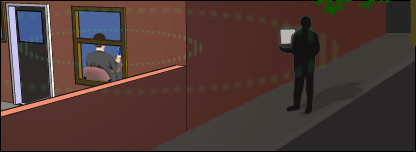BBC News Magazine reports about the case where a man has been arrested after being spotted allegedly sitting in a street with a laptop using someone else’s unsecured wireless connection.

The discussion in this article is pretty interesting. A lot of people seem to think it’s OK to borrow some of this wireless internet since it wasn’t secured.
Ken from Evesham writes:
If you leave your wireless connection unsecured then it is your own fault. Just as you wouldn’t leave your front door unlocked, neither should you leave your wireless connection open.
To a certain extend I agree with Ken. It’s generally a bad idea to leave your front door unlocked, likewise you should secure your wireless internet *IF* you don’t want anybody walking in/using your internet connection. Now most people probably don’t want their house to be invaded by perfect strangers, but is it the same with their wireless connection? Do people really care? Do they even know their connection is left open for others to use?
In many cases, I think not. Many times I’ve experienced people’s total surprise when they find out their newly installed wireless router is open for use by anyone within broadcast range. They just don’t know how these things work. Computers have moved from the kingdom of geeks to your everyday family, but these new users generally don’t even know how to tell a legitimate email from a phishing scam email, let alone what WEP or WPA means.
However, I do believe it simply should NOT be possible to get punished for using someone else’s unsecured wireless network, simply because an unsecured network kind of implies it’s open to use. This is not the same as walking into a house, which is someone’s property.
Gerard from Naarden (Holland) writes:
I have not asked, nor do I particularly want to be irradiated by the wireless networks from my neighbours – I can pick up about a dozen. If it enters my house, I should be able to do with it what I want. Don’t like it? Get wired!
But alas, if you’re planning on cancelling your internet service and start using a free connection instead, there are already laws forbidding this. (at least in the UK).
The Communications Act 2003 says a “person who (a) dishonestly obtains an electronic communications service, and (b) does so with intent to avoid payment of a charge applicable to the provision of that service, is guilty of an offence”.
If I am travelling and I borrow a connection from an open network to spend 2 minutes on the internet, is that an offence because I could’ve bought a calling card to use with my mobile phone? When exactly does it become stealing?
Adrian from Manchester (UK) writes:
I don’t really see how it can be “stealing” if the person who paid still has all of what they paid for. In that respect, it’s not like your example of taking an apple from the overhanging branch of a tree.
Hmmm, this reminds me of copyright violation. When I download a movie or commercial computer game, I’m not stealing because I didn’t physically remove anything from anyone, right? Many people seem to justify downloading whatever they want with this type of reasoning.
Back to the wireless networks though… Microsoft Windows even attempts to connect to any unsecured networks it finds. Would it be a criminal offence if you’re unlucky enough to have some open networks in your vicinity?
Perhaps manufacturers need to make sure their wireless products come with security enabled by default, where users should explicitly configure the device to work in unsecured mode, and thereby waive the right to charge anyone with stealing their internet.
But hey, do you really want to leave your wireless network open for people to (ab)use. People commit crimes online you know…


